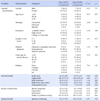Abstract
Purpose
This study was conducted in order to investigate changes in the physical, psychosocial and spiritual health of people with mental disorder in community participating in the Integrated Health Care Program (IHCP).
Methods
This study applied the non-equivalent control group pretest-posttest quasi-experimental design. The participants were 37 chronic psychiatric patients who had been clinically diagnosed with mental disorder and visiting a mental rehabilitation center located in S City (17 in the experimental group, and 20 in the control group). The experimental group participated in the IHCP consisting of 24 sessions for eight weeks.
Results
After the intervention, only the participants in the experimental group reported significant improvement in physical (body mass, triglyceride), psychosocial (mental symptoms, depression, self-esteem, ability of problem solving), and spiritual wellbeing when compared with those in the control group.
Conclusion
These results indicate that IHCP is effective in improving the physical, psychosocial, and spiritual wellbeing of people with mental disorder. Therefore, IHCP developed in this study is considered a useful nursing intervention for raising the comprehensive health level of people with mental disorder in community.
Figures and Tables
Table 1
Contents of Integrated Health Promotion Program

Table 2
Homogeneity of General Characteristics and Dependent Variables

Table 3
Differences in Dependent Variables between Experimental and Control Groups

References
1. Jo MJ, Bae A, Bae JN, Son JW, Ahn JH, Lee DW, et al. The epidemiological survey of mental disorders in Korea. Seoul: Ministry of Health and Welfare;2012. p. 227.
2. Nordentoft M, Wahlbeck K, Hällgren J, Westman J, Osby U, Alinaghizadeh H, et al. Excess mortality, causes of death and life expectancy in 270,770 patients with recent onset of mental disorders in Denmark, Finland and Sweden. PLoS One. 2013; 8(1):e55176. DOI: 10.1371/journal.pone.0055176.

3. Krane-Gartiser K, Breum L, Glümer C, Linneberg A, Madsen M, Køster A. Prevalence of the metabolic syndrome in Danish psychiatric outpatients treated with antipsychotics. Nord J Psychiatry. 2011; 65(5):345–352. DOI: 10.3109/08039488.2011.565799.

4. Krogh J, Speyer H, Nørgaard HCB, Moltke A, Nordentoft M. Can exercise increase fitness and reduce weight in patients with schizophrenia and depression? Front Psychiatry. 2014; 5:89. DOI: 10.3389/fpsyt.2014.00089.

5. Grover S, Davuluri T, Chakrabarti S. Religion, spirituality, and schizophrenia: A review. Indian J Psychol Med. 2014; 36(2):119–124. DOI: 10.4103/0253-7176.130962.

6. Ko MS, Kim TS, Min S, Park JS, Yeom YH. Introduction to nursing. 3rd ed. Seoul: Soomoonsa;2011. p. 536.
7. Roder V, Mueller DR, Schmidt SJ. Effectiveness of integrated psychological therapy (IPT) for schizophrenia patients: A research update. Schizophr Bull. 2011; 37:Suppl 2. S71–S79. DOI: 10.1093/schbul/sbr072.

8. Bennett MP. Multidimensional factors affecting wellbeing: A model of multi-level nursing practice [dissertation]. [Indiana]: Indiana State University;2002. 198.
9. Oh KO. The effect of aerobic exercise on chronic schizophrenia. J Korean Acad Nurs. 1994; 24(1):5–17.
10. Chung KS. Effects of group art therapy program on self-esteem and mental health status in chronic schizophrenic Inpatients. J Korean Acad Nurs. 1999; 29(6):1314–1323.

11. Kim YS, Choi YB. The revised guideline for the obesity management. Seoul: Korean Society for the Study of Obesity;2012. p. 198.
12. Overall JE, Gorham DR. The brief psychiatric rating scale. Psychol Rep. 1962; 10(3):799–812. DOI: 10.2466/pr0.1962.10.3.799.

13. Song MS, Kim SM, Kim JI, Cho NO. Measurement in gerontology research. Seoul: Hana Publication;2007. p. 435.
14. Beck AT, Ward CH, Mendelson M, Mock J, Erbaugh J. An inventory for measuring depression. Arch Gen Psychiatry. 1961; 4(6):561–571. DOI: 10.1001/archpsyc.1961.01710120031004.

15. Lee YH, Song JY. A study of the reliability and the validity of the BDI, SDS, and MMPI-D scales. Korean J Clin Psychol. 1991; 10(1):98–113.
16. Heppner PP, Peterson CH. The development implications of a personal problem-solving inventory. J Couns Psychol. 1982; 29(1):66–75. DOI: 10.1037/0022-0167.29.1.66.
17. Jeon SK. A study on the effectiveness of social skills training program for rehabilitation of the schizophrenic patients [dissertation]. [Seoul]: Soongsil University;1995. 178.
18. Rosenberg M. Society and the adolescent self-image. Princeton, NJ: Princeton University Press;1965. p. 326.
19. Jon BJ. Self-esteem: A test of its measurability. Yonsei Nonchong. 1974; 11(1):107–130.
20. Ellison CW. Spiritual well-being: Conceptualization and measurement. J Psychol Theol. 1983; 11(4):330–340.

21. Choi SS. A correlational study on spiritual wellness, hope and perceived health status of urban adult [dissertation]. [Seoul]: Yonsei University;1991. 81.
22. Fisher S, Shelly JA. Spiritual care: The nurse's role. Illinois: Inter Varsity Press;1988. p. 251.
23. Zschucke E, Gaudlitz K, Ströhle A. Exercise and physical activity in mental disorders: Clinical and experimental evidence. J Prev Med Public Health. 2013; 46:Suppl 1. S12–S21. DOI: 10.3961/jpmph.2013.46.S.S12.

24. Vancampfort D, Probst M, Skjaerven LH, Catalan-Matamoros D, Lundvik-Gyllensten A, Gomez-Conesa A, et al. Systematic review of the benefits of physical therapy within a multidisciplinary care approach for people with schizophrenia. Phys Ther. 2012; 92(1):11–23. DOI: 10.2522/ptj.20110218.

25. Pearsall R, Smith DJ, Pelosi A, Geddes J. Exercise therapy in adults with serious mental illness: A systematic review and meta-analysis. BMC Psychiatry. 2014; 14:117. DOI: 10.1186/1471-244X-14-117.

26. Kukkonen-Harjula KT, Borg PT, Nenonen AM, Fogelholm MG. Effects of a weight maintenance program with or without exercise on the metabolic syndrome: A randomized trial in obese men. Prev Med. 2005; 41(3-4):784–790. DOI: 10.1016/j.ypmed.2005.07.008.

27. Kwon JH, Koh Y. A preliminary study on the effectiveness of social-cognition enhancing rehabilitation program. Korean J Clin Psychol. 2002; 21(2):281–292.
28. Crawford MJ, Patterson S. Arts therapies for people with schizophrenia: An emerging evidence base. Evid Based Ment Health. 2007; 10(3):69–70. DOI: 10.1136/ebmh.10.3.69.

29. Ko HJ, Youn CH. Effects of laughter therapy on depression, cognition and sleep among the community-dwelling elderly. Geriatr Gerontol Int. 2011; 11(3):267–274. DOI: 10.1111/j.1447-0594.2010.00680.x.





 PDF
PDF ePub
ePub Citation
Citation Print
Print




 XML Download
XML Download